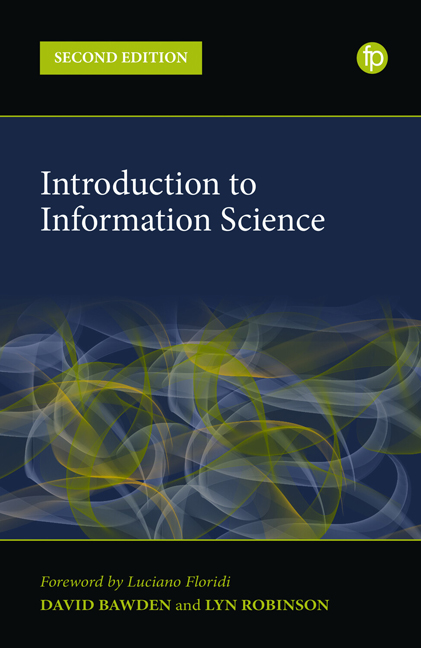Book contents
- Frontmatter
- Contents
- Figures
- Preface
- Foreword – Curators of Semantic Capital
- List of Acronyms
- 1 The Information Science Discipline
- 2 History of Information: the Story of Documents
- 3 Philosophies of Information
- 4 Paradigms, Turns and Theories in the Information Sciences
- 5 Information
- 6 Documents and Documentation
- 7 Domain Analysis
- 8 Information Organisation
- 9 Digital Technologies and Data Systems
- 10 Information Systems
- 11 Informetrics
- 12 Information Behaviour
- 13 Communicating Information: Changing Contexts
- 14 Information Management and Policy
- 15 Information Law and Ethics
- 16 Information Society
- 17 Digital (Onlife) Literacies
- 18 Research in the Information Sciences
- 19 The Future of the Information Sciences
- Additional Resources
- Index
17 - Digital (Onlife) Literacies
Published online by Cambridge University Press: 21 April 2022
- Frontmatter
- Contents
- Figures
- Preface
- Foreword – Curators of Semantic Capital
- List of Acronyms
- 1 The Information Science Discipline
- 2 History of Information: the Story of Documents
- 3 Philosophies of Information
- 4 Paradigms, Turns and Theories in the Information Sciences
- 5 Information
- 6 Documents and Documentation
- 7 Domain Analysis
- 8 Information Organisation
- 9 Digital Technologies and Data Systems
- 10 Information Systems
- 11 Informetrics
- 12 Information Behaviour
- 13 Communicating Information: Changing Contexts
- 14 Information Management and Policy
- 15 Information Law and Ethics
- 16 Information Society
- 17 Digital (Onlife) Literacies
- 18 Research in the Information Sciences
- 19 The Future of the Information Sciences
- Additional Resources
- Index
Summary
Any attempt to constitute an umbrella definition or overarching frame of digital literacy will necessarily involve reconciling the claims of myriad concepts of digital literacy, a veritable legion of digital literacies.
Colin Lankshear and Michele Knobel (2008, 4)There's no doubt that it will be difficult to shift the information literacy narrative from emphasizing finding, evaluating, and using information in an academic setting to something that addresses a broader understanding of how information ‘works’ these days.
Barbara Fister (2021, 5)Introduction
The ability to use information effectively, in all formats, in a largely digital information environment is a vital life skill for everyone. This ability is variously termed information literacy, digital literacy and media literacy, with numerous other literacies having been mentioned. We will use digital literacies as an overall term, linked to the concept of onlife, for reasons explained later, using the other terms where appropriate. What constitutes each of these literacies, how they relate to each other, and how they can best be taught and promoted, has caused much debate.
The promotion of digital literacies has been seen as an important task for information professionals in all sectors. Indeed, CILIP includes, as one of its seven principles for ethical information professionals, a commitment to uphold the development of information skills and information literacy. Identified as an important issue since the 1990s, it has gained in importance as a claimed solution to the pathologies of the current information environment (Bawden and Robinson, 2009; 2011; 2020): information overload, misinformation, disinformation, information anxiety, etc. While information literacy training has largely been centred in libraries in secondary and tertiary education, as a replacement for traditional bibliographical instruction, there is an increased interest in its promotion in the workplace, and in society generally. The question of whether this can be a generic ability or whether it can be promoted only in the context of a specific subject is still debated, while the issue of multicultural information literacy has gained attention.
In this chapter, after explaining why we prefer the ‘digital literacies’ term, we will look at the variety of literacies of information. We will outline some of the more important concepts and models, consider the contexts in which they may be applied and the relation of generic and subject-specific digital literacies and how it may be affected by linguistic and cultural factors.
- Type
- Chapter
- Information
- Introduction to Information Science , pp. 331 - 350Publisher: FacetPrint publication year: 2022



